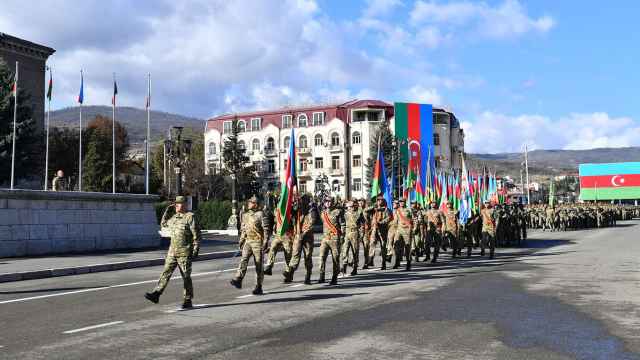As most of Europe goes on a Christmas shopping spree, their governments hope the holiday season will spur enough consumption to allow them to raise a bit more tax revenues and protect them from the ill political fate of selling stakes in state-controlled companies. It seems unlikely though. As European governments, especially those in the Mediterranean, prepare tenders for national oil and gas companies, banks, ports, airports and everything else you can sell above the symbolic 1 euro (plus debts), they turn to traditional investors in such large-scale projects.
While the typical investor to be found in infrastructure privatization tenders in Europe is a Chinese state-associated fund (or two), the reputation of Russian investors as having a taste for big assets is still very much intact, with their increased presence seen in energy sector privatization processes Europe-wide. Although there are still weeks to go until the holiday season by the Julian calendar, it looks like Christmas came early for Russian investors this year.
In debt-ridden Greece, the government committed to raising over 50 billion euros through privatization and launched the second round of its privatization program in October. The program makes it supposedly the world's largest privatization program of state-owned assets after World War II. With vast experience behind them, prime Russian investors are bidding for energy assets in several sectors. The most prominent privatization process is that of DEPA, the state natural gas company. A profitable business in itself, DEPA is up for sale at an estimated 1.5 to 2 billion euros, and its privatization has specifically been geared toward Russian investors — or a Russian gas investor, Gazprom. Located in the heart of the Balkans and positive in spite of market conditions in Greece, the Greek privatization fund, HRADF, is predicting that Gazprom will pay a handsome premium of up to 50 percent to ensure its acquisition. The commitment is strategically justified, with Greek crisis discounts applied, the company's strong fundamentals even in very rough market conditions and most importantly, Greece's (and DEPA's) geographic position as a leading hub for gas from the Caucasus and East Mediterranean to the Balkans and the EU through Italy. Furthermore, Gazprom's Balkan strategy, largely relying on the recently revived South Stream development in Serbia and Hungary, will be greatly complemented with the acquisition of DEPA. Finally, recent offshore natural gas discoveries in Greece (with early estimates of $600 billion worth of reserves) might prove a compelling target for both partial privatization by Greece and acquisition of Gazprom as it develops its own offshore capacities. Greek officials emphasized know-how as an important factor in selecting a partner for DEPA — second only to the amount of cash offered — thus making Gazprom the likely candidate in spite of the high spirits Gazprom's entry into the Greek gas market is causing in the EU Commission.
To the north, in Serbia, Gazprom has pushed through a deal on the South Stream with the slightly pro-Russian government. Recently, NIS, the Serbian oil and gas company owned by Gazprom Neft, announced ambitious plans to expand exploration to 10 new southeastern-European countries by 2010 through the acquisition of stakes in projects and companies as well as joint ventures with larger companies in the region. Through NIS, Gazprom Neft is also participating in a privatization tender for on- and offshore sites in Greece, and it has announced its intention to participate in upcoming offshore tenders in Croatia as well. Russian investors are also notably bullish in the oil sector of Serbia's neighboring Bosnia and Herzegovina, with Zarubezhneft's ambitious entry through the privatization of an oil refinery in Brod and the acquisition of Slovenian oil retailer Petrol's Bosnian oil retail subsidiary. Recently, Gazprom Neft, again through Serbian NIS, has started buying up and consolidating smaller oil retail chains throughout Bosnia. Gazprom and other investors from Russia applied the same approach in recent acquisitions in Bulgaria, Romania and the former Yugoslav Republic of Macedonia.
It's not just about European tenders though. Recently, Russian tenders started opening up for European and other foreign investors as well. The successful and widely praised privatization of Sberbank paved the way for increased involvement and reliance on foreign investors in the forthcoming privatizations of Russian state companies. The Russian authorities' privatization plan, aimed at raising over $29 billion by the end of 2013, will necessarily have to include foreign investors, as domestic markets are no match for the ambitious privatization targets. While Russian companies' foreign acquisitions are usually in favorable investor climates with few legal roadblocks and in majority stakes, foreign investors in Russia cannot expect the same with much certainty. The new Russian privatization plans do not include giving up state control of assets in most cases. In order for its privatization plan to succeed, the Russian governments must ensure foreign investors have the same level of legal security and transparency that its own companies are guaranteed abroad. Shopping abroad is always easier.
A Message from The Moscow Times:
Dear readers,
We are facing unprecedented challenges. Russia's Prosecutor General's Office has designated The Moscow Times as an "undesirable" organization, criminalizing our work and putting our staff at risk of prosecution. This follows our earlier unjust labeling as a "foreign agent."
These actions are direct attempts to silence independent journalism in Russia. The authorities claim our work "discredits the decisions of the Russian leadership." We see things differently: we strive to provide accurate, unbiased reporting on Russia.
We, the journalists of The Moscow Times, refuse to be silenced. But to continue our work, we need your help.
Your support, no matter how small, makes a world of difference. If you can, please support us monthly starting from just $2. It's quick to set up, and every contribution makes a significant impact.
By supporting The Moscow Times, you're defending open, independent journalism in the face of repression. Thank you for standing with us.
Remind me later.





